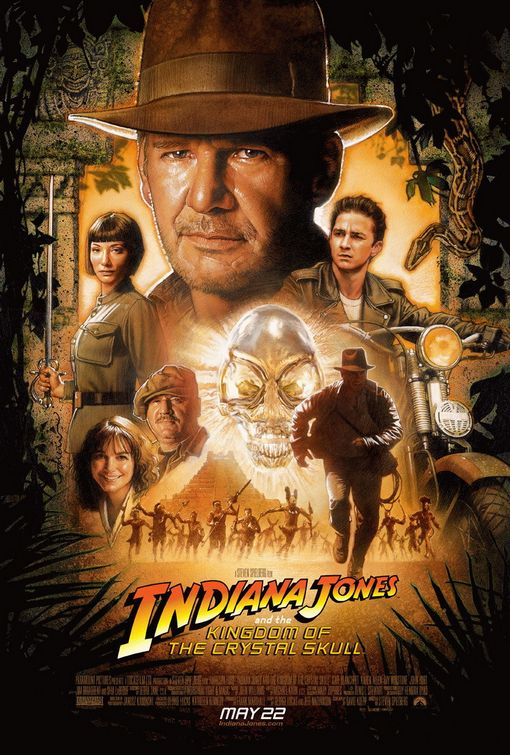Archive for the ‘Steven Spielberg’ Category
80th Golden Globe Awards
Took Place on Tuesday 10th January 2023 in Los Angeles and hosted by the Hollywood Foreign Press Association at the Beverly Hilton Hotel – Here are the 2023 Golden Globe Winners in the Film Categories:

Best Film Drama: The Fabelmans

Best Film Musical or Comedy: The Banshees of Inisherin

Best Director: Steven Spielberg – The Fabelmans

Best Actress Drama: Cate Blanchett – Tar

Best Actor Drama: Austin Butler – Elvis

Best Actress Musical or Comedy: Michelle Yeoh – Everything Everywhere All At Once
Best Actor Musical or Comedy: Colin Farrell – The Banshees of Inisherin

Best Supporting Actress: Angela Bassett – Wakanda Forever

Best Supporting Actor: Ke Huy Quan – Everything Everywhere All At Once

Best Foreign Language Film – Argentina 1985 directed by Santiago Mitre
Persistence of Vision
The Fabelmans
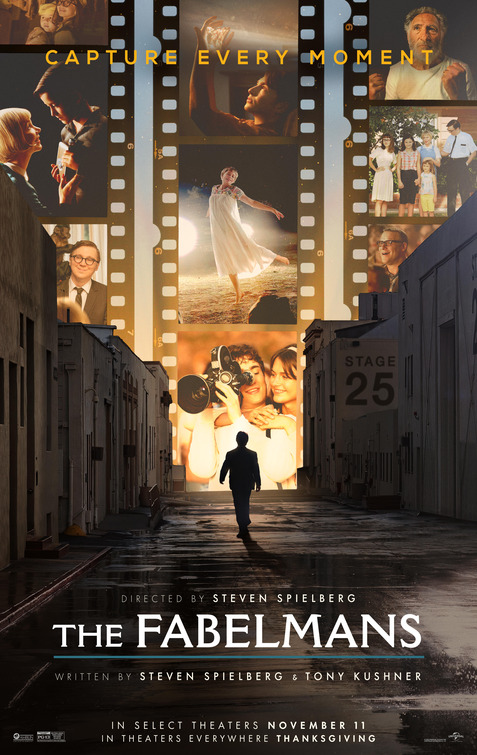
Director: Steven Spielberg
Cast: Michelle Williams, Paul Dano, Seth Rogen, Judd Hirsch, Gabriel LaBelle, Julia Butters, Mateo Zoryan, Julia Butters, Sam Rechner, Oakes Fegley
Running Time: 2 hours 31 minutes
Film Rating: 9 out of 10
Oscar winning director Steven Spielberg (Schindler’s List, Saving Private Ryan) makes his most personal film by far, with the critically acclaimed film The Fabelmans which won the People’s Choice Award at the 2022 Toronto International Film Festival (TIFF), a sure indicator of multi Oscar nominations.
The Fabelmans is a fictional account of Spielberg’s childhood and his idyllic love of cinema and focuses on a boy Sammy Fabelman brilliantly played respectively by Mateo Zoryan as a young boy and Gabriel LaBelle as the teenager and wisecracking Jewish kid who turns his hobby of filmmaking into a career choice.
With an excellent script by Tony Kushner (Munich, Lincoln), The Fabelmans focuses on a Jewish family in America in the 1950’s and 1960’s starting in New Jersey and moving across the country first to Arizona and then finally to California. Sammy’s parents Burt and Mitzi Fabelman are played by Paul Dano (Little Miss Sunshine, 12 Years a Slave, There will be Blood) and four time Oscar nominee Michelle Williams (Brokeback Mountain, Blue Valentine, My Week with Marilyn, Manchester by the Sea).
Michelle Williams finally deserves an Oscar for her complex portrayal of Mitzi Fabelman a slightly off kilter but talented mother who will do anything for Sammy and his three sisters but is willing to risk everything for true love.
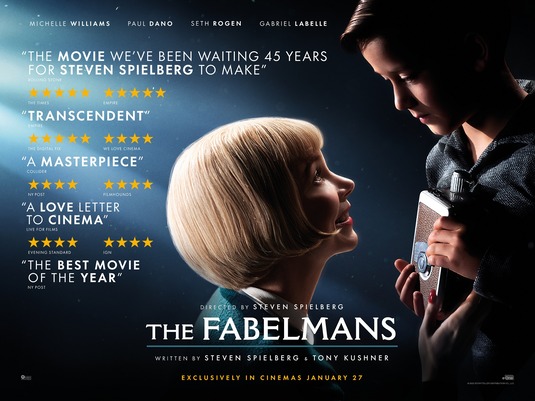
Williams’s performance is mesmerizing in The Fabelmans and she creates the emotional centre for this film, particularly in the superbly acted scenes between Mitzi and her son Sammy as he negotiates adolescence and discovers a secret about his mother which will rip his family apart.
In between all the family drama, there is Sammy’s persistent love of cinema and his dedicated desire to film everything and in the end does capture every moment even the scenes that are not meant to be filmed. Even at high school besides being terrorized for being the only Jewish boy at a predominantly Christian school in Northern California he even films the Ditch Day at the Beach and makes one of his archenemies and school jock Logan Hall played by rising star Sam Rechner uncomfortable when he sees himself on screen.
Audiences should watch out for a superb cameo by veteran actor Judd Hirsch as Uncle Boris who influences young Sammy into following his dreams of becoming a film maker.
With superb cinematography by Spielberg regular and Oscar winner Janusz Kaminski (Schindler’s List, Saving Private Ryan) and excellent ensemble acting, The Fabelmans is a love letter to traditional cinema, to the art of film making while effortlessly exploring serious issues including anti-Semitism, infidelity and mental health.
The Fabelmans is a top class film: elegant, nostalgic and perfectly acted. Highly recommended viewing, this excellent film gets a film rating of 9 out of 10 and signifies Spielberg’s undisputed persistence of vision as a top calibre film director.
Gangs Without Territory
West Side Story
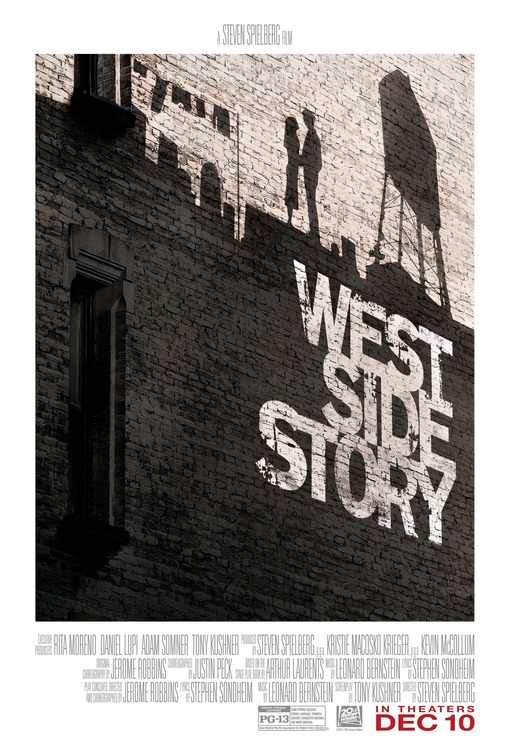
Director: Steven Spielberg
Cast: Rachel Zegler, Ansel Elgort, Corey Stoll, Rita Moreno, David Alvarez, Ariana Debose, Brian d’Arcy James, Mike Faist
Film Rating 9.5 out of 10
Running time: 2 hours and 36 minutes
Oscar winning director Steven Spielberg’s cinematic adaptation of West Side Story is truly phenomenal.
A vibrant, beautifully filmed remake of the 1961 film which won 10 Oscars back then and is going to sweep the board at Oscar season in 2022. With a beautiful script by Tony Kushner, the multi award winning playwright who penned the 1990 AIDS drama Angels in America, West Side Story tells the story of two rival teenage street gangs in New York City in 1957, as their neighbourhoods are going to be torn down, to make way for the building of the now impressive Lincoln Theatre on the edge of Manhattan and Harlem.
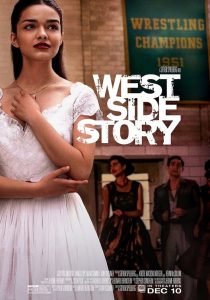
More significantly West Side Story is a contemporary adaptation of William Shakespeare’s Romeo and Juliet with all the themes of forbidden love, the individual versus society and the inevitability of fate, violence and sexual desire. Impressively, director Steven Spielberg’s West Side Story is beautifully shot, with vibrant colour saturation, authentic production design and choreography and dance numbers that will dazzle the audiences and then pull them into the fate of the two star crossed lovers: Tony superbly played by Ansel Elgort (The Goldfinch, Baby Driver, The Fault in Our Stars) and Broadway star turned film actress Rachel Zegler who plays the beautiful Puerto Rican girl Maria.
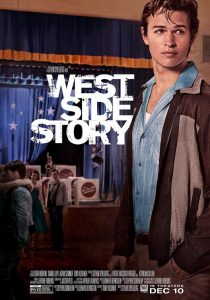
In a genius stroke of casting, Rita Moreno who won an Oscar for Best Supporting Actress in the 1961 version of West Side Story is cast as Tony’s Puerto Rican boss Valentina, who also steals the show.
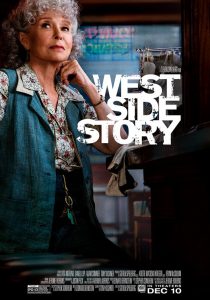
West Side Story sensitively addresses the contemporary issues facing most industrialized cities today: gentrification, turf warfare, gang violence, xenophobia and systemic racism with a flamboyance and a style which is both insightful and entertaining.
As Tony and Maria meet at a dance off in a beautiful colour saturated scene highly representative of the opulent Capulet Ball scene in director Baz Luhrmann’s 1997 William Shakespeare’s Romeo and Juliet, their fate is sealed forever, as Tony, a Polish ex-con falls helplessly in love with the gorgeous Maria a young Puerto Rican teenager who makes a living cleaning plush department stores by night .
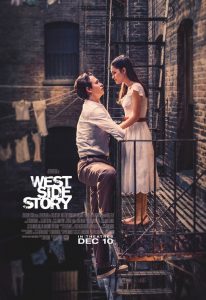
From the beautiful balcony scene, with washing flying in the moonlit night, Tony climbs up to Maria’s apartment and professes undying love for her despite their opposing cultural backgrounds and that they both come from rival gangs which are fighting over a territory which will soon be demolished.
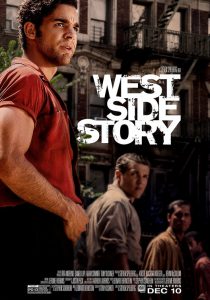
Representative of Tybalt, Maria’s hot headed brother Bernardo is played with all the machismo and bravado of a young gang leader by David Alvarez. Mercutio is represented on the other end by Riff played by another Broadway star Mike Faist, a dynamic fast talking hothead and best friend of Tony who refuses to back down against the threat of violence.

Ariana DeBose (The Prom, Hamilton) also shines in a riveting performance as Bernando’s girlfriend Anita and mentor to Maria and deserves an Oscar nomination for Best Supporting Actress.
As a film, West Side Story is truly remarkable, from the beautifully choreographed dance numbers to the stunning costumes, to the authenticity of recreating New York City in 1957, as this magical city was transforming into a new modern metropolis of the 1960’s. The film is shot with luminescent cinematography by Polish director of photography Janusz Kaminski who won Oscars for Schindler’s List and Saving Private Ryan.
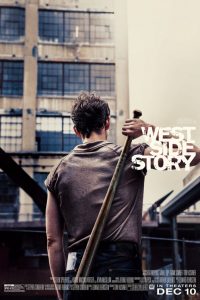
Once again Oscar winning director of Schindler’s List and Saving Private Ryan, Steven Spielberg directs a flawless film, from the way that the dance numbers are set up, to the editing and production design as he effortlessly recaptures all the vibrancy and violence of a forbidden love torn apart by rival gangs, gentrification and systemic racism.
West Side Story gets a film rating of 9.5 out of 10 and is real cinematic gem, a truly brilliant film with a superb script by Tony Kushner and a cast that is as authentic as they are talented.
This 21st century retelling of a classic musical is highly recommended viewing and remains as relevant today as it did back in 1961.
History’s First Draft
The Post
Director: Steven Spielberg
Cast: Meryl Streep, Tom Hanks, Sarah Paulson, Jesse Plemons, Carrie Coon, Bob Odenkirk, Bruce Greenwood, Tracy Letts, Michael Stulbarg, Matthew Rhys, Bradley Whitford, Alison Brie
Before Julian Assange, before Edward Snowden, there was the Pentagon Papers.
A top level government study on how the Americans had been involved in Vietnam way before the infamous Vietnam War and how during that bloodletting fiasco, the Americans realized that they were losing the war in South East Asia, yet still continued to send troops in to fight the Viet Cong.
The leaking of the Pentagon Papers, firstly by the New York Times and then more pertinently by The Washington Post during the Nixon administration is the source of Oscar winning director Steven Spielberg’s fascinating film The Post starring two Oscar winners, Meryl Streep (The Iron Lady) as owner of the Post, Katherine Graham and Tom Hanks (Philadelphia) as Ben Bradlee, the executive editor of The Washington Post https://www.washingtonpost.com/ who seizes on the story of a decade and pushes for his newspaper to release the classified documents despite the possible legal or financial consequences.
Streep as usual, is superb as the doubtful and affluent socialite Katherine Graham who inherits her father’s newspaper The Washington Post upon her husband’s death and then is forced into an invidious position when she is called upon to make the critical decision on whether to let the newspaper publish the Pentagon Papers at a time when New York investors are eagerly awaiting The Washington Post Company’s IPO (Initial Public Offering) on the American Stock Exchange, which could hugely benefit the fortunes of the struggling newspaper.
Spielberg packs a lot into The Post, and it would be advisable for viewers to read up thoroughly about that crucial historical period in 1971 which was so decisive and widely regarded as the turning point of American press freedom. All these events occurred prior to the Watergate scandal.
The publication of the Pentagon Papers ultimately changed the American public’s sentiment on the viability of troops in Vietnam and the legal outcome after the Supreme Court ruling elevated Katherine Graham to a media doyenne, a feminist and a massively influential woman who changed the business world’s view on how a single woman can influence and transform a media empire.
There is a solid supporting cast of actors in The Post to add gravitas to a riveting tale of journalistic bravery, including Sarah Poulson as Bradlee’s wife Toni who gives her own feminine perspective on why what Katherine Graham was doing was vitally important and brave. Other supporting actors include Bob Odenkirk, Matthew Phys, Carrie Coon, Jesse Plemons and Tracy Letts.
In the age of the Internet, Fake News and a 24 Hour news cycle, The Post is a critical film to watch and be discussed and is especially relevant in 2018 as back then in 1971, which basically implies that at every historical junction, the media must always hold the country’s government accountable. After all, the news is History’s First Draft.
My only criticism is that screenwriters Liz Hannah and Josh Singer should have contextualized the dramatic events more efficiently so that a 21st century audience could appreciate the bravery of publishing critical information without fear or favour.
The Post is brilliant viewing and a highly recommended film about press freedom under a sinister government which makes the film’s ending all the more relevant. The Post receives a film rating of 8.5 out of 10.
Read more on Katherine Graham – https://en.wikipedia.org/wiki/Katharine_Graham
Read more on Ben Bradlee – https://en.wikipedia.org/wiki/Ben_Bradlee
The Standing Man
Bridge of Spies
Director: Steven Spielberg
Cast: Tom Hanks, Mark Rylance, Alan Alda, Amy Ryan, Jesse Plemons, Austin Stowell, Sebastian Koch, Will Rogers, Billy Magnussen, Eve Hewson
The opening shot of Bridge of Spies features a suspected spy painting a self portrait of himself in a dingy Brooklyn flat, symbolic of a reflective look at the characters involved in the Cold War and the complicity of the two superpowers whose distrust of each other ripened over four subsequent decades.
Oscar Winner Tom Hanks (Philadelphia, Forest Gump) plays insurance lawyer turned defence attorney in the Steven Spielberg directed Cold War thriller, Bridge of Spies, which despite its length is an absorbing and fascinating film set amidst 1950’s paranoia, propaganda and old fashioned espionage.
With a script by the Coen brothers and Matt Charman, Bridge of Spies raises the profile of British actor Mark Rylance, Emmy nominated for his superb portrayal of Thomas Cromwell in the BBC series Wolf Hall, as suspected spy Rudolf Abel who is arrested in his Brooklyn apartment by American government agents for espionage.
Tom Hanks in one of his most likable performances to date since his brilliant turn in Captain Philips, plays James B. Donovan who at the request of his law firm is asked to give Abel a fair trial despite public opinion being considerably stacked against him. This is 1957 America, a country in the grip of McCarthyism and Cold War paranoia. The Russians are building a wall to divide Berlin in half and each super power is suspected of stockpiling a nuclear arsenal sufficient enough to repeat the horrors of Hiroshima, which ended World War II in 1945.
As the intricate narrative arc of Bridge of Spies unfolds, complete with period production design and gritty cinematography by Janusz Kaminski, it is apparent that Donovan realizes the potential of keeping Abel alive in case for whatever reason the Americans need to use him as a trade for one of their citizens that could potentially be captured behind enemy lines.
This prediction happens sooner than expected when an American pilot, sanctioned by the CIA, Francis Powers, played by Austin Stowell (Whiplash) is shot down and captured in Soviet territory and duly interrogated by the Russians about the spy plane he was flying. To add to the mix, as Berlin is being divided in half by the infamous wall, an American economics student Frederic Pryor played by Will Rogers is captured by the East Germans and who want to use him as a means for these two super powers to recognize the sovereignty of the German Democratic Republic (East Germany) German Democratic Republic.
Oscar winning veteran director Spielberg (Schindler’s List, Munich and Saving Private Ryan) skilfully weaves a very complex espionage tale in which his two main leads Hanks and Rylance have sufficient screen time to paint a portrait of an unusual relationship between attorney and client surpassing the perceived notion of a lawyer defending a suspected spy.
This public conception of Abel’s guilt and Donovan’s sympathy towards his clients is brilliantly portrayed in an affecting scene on the New York subway where commuters all stare at Donovan with disdain after reading press coverage of the trial in the morning newspapers.
Bridge of Spies is an absorbing historical drama about the Cold War, yet at 141 minutes, the film could have been edited although Rylance and Hanks are terrific in their roles as Abel and Donovan. The supporting cast includes Amy Ryan, Alan Alda, Jesse Plemons and Sebastian Koch. Highly recommended viewing for those that relish a vintage spy drama, something which is rarely seen in this digital age.
Tapping into Imagined Mythologies
Indiana Jones and The Kingdom of the Crystal Skull
Director Steven Spielberg
Cast: Harrison Ford, Shia LaBeouf, Cate Blanchett, John Hurt, Ray Winstone
(Review originally published in June 2008)
Almost twenty years on from the last Indiana Jones film, the fourth installment of Steven Spielberg and George Lucas original blockbuster trilogy, Indiana Jones and the Kingdom of the Crystal Skull had its world premiere at the Cannes film festival last month. The latest Indiana Jones marks the beginning of the so-called American Summer Movie Blockbuster season. Naturally many critics and viewers alike were dubious about the 65-year old Harrison Ford reprising his role as the adventurous globetrotting relic hunter and archaeologist. However, fans of the original three enormously successful films all centering on our whip-cracking hero in search of a mythical artifact at odds with a nefariously evil regime in close pursuit, while journeying to exotic locations around the globe, will not be disappointed with this latest installment.
Obviously, the creators both Lucas and Spielberg, the men behind such fantastic films as the Star Wars trilogy and War of the Worlds, are confident creators and know their territory well. Combining lots of fast-paced action sequences with some surprisingly consistent characterization and additions of new villains and side-kicks, along with some old-style drama, Indiana Jones and the Kingdom of the Crystal Skull is a skillful blending of several genres from the cowboy to the science fiction, while tapping into several imagined mythologies from the ancient Inca lost cultures of the Amazon to the urban myth of Hangar 51 and the Roswell incident, involving the American government’s secretive cover-up of an alien space craft that apparently crash landed in the New Mexican desert in 1947.
This film is set ten years on and firmly places the period of the action in the late 1950’s a time of the Red Scare, with McCarthyism sweeping America, a daunting decade when Communist infiltration was suspected in every aspect of American life. Into the mythology of the Roswell alien sighting at New Mexico and the lost city of El Dorado, an ancient Amazon city of Gold, which was believed to have existed at the Spanish conquest of South America in the early 1500’s, Spielberg and Lucas add the Stalinist era Soviets as Indiana’s arch enemies, headed by a blue-eyed sword wielding villain Dr Irina Spalko, an energetic performance by the Oscar winning Cate Blanchett (The Aviator).
In a rare genius of casting, Karen Allen reprises her role as Marion Ravenwood first seen in Raiders of the Lost Ark and the hot new Hollywood talent, Shia La Beouf stars as the spunky and wild Mudd, sporting a look reminiscent of the young Marlon Brando from his breakthrough film in The Wild One, kitted out in black leather cap and jacket skillfully riding a Harley Davidson and shattering the tranquility of an American town.
Even if you are new to the mythologies of Indiana Jones, this fourth installment is a great piece of entertainment in its own right, with thrilling action sequences, minimal CGI usage and a brilliant storyline tapping into several historical and imagined mythologies, while keeping a sense of humour and retaining a long espoused theory that many of the magnificent architectural wonders of ancient civilizations, from the pyramids of Egypt to the Amazonian Temples are tied into something vastly supernatural and way beyond anything we, as mere mortals, could possibly believe. Whether it’s the quest of infinite knowledge or that promised chalice of immortality, suspend your disbelief and take two hours to see this thrilling, fascinating and much anticipated sequel. Indiana Jones and the Kingdom of the Crystal Skull will surely not disappoint and has already proven its worth in international Box office gold.




